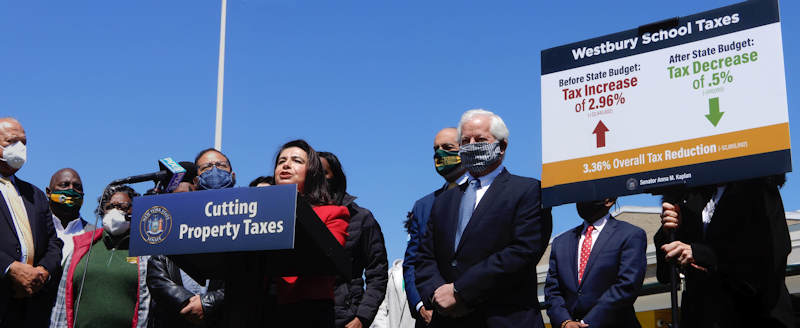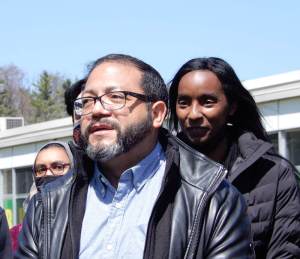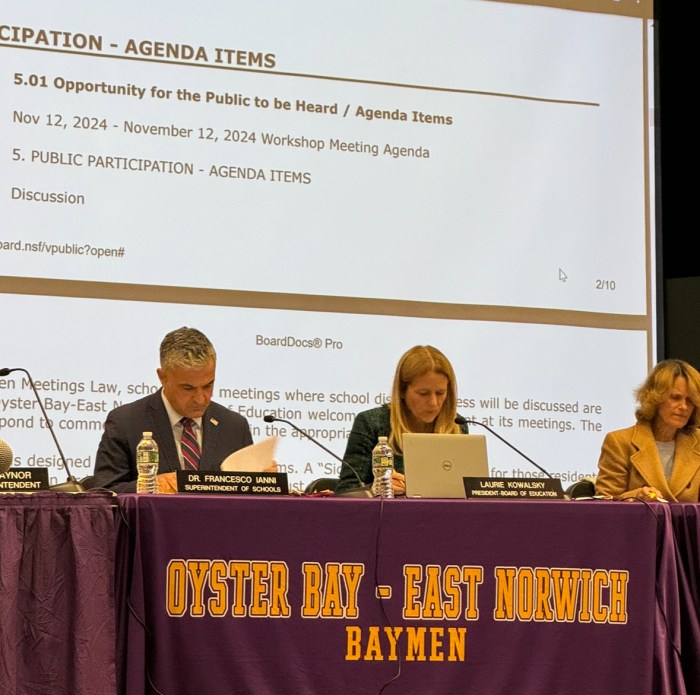Westbury expects to receive long promised state aid

Thanks to the largesse in the state budget, the Westbury School District can give a rare gift to its property-owning residents: a lower tax levy for the 2021-22 school year. And perhaps beyond.
State Senator Anna Kaplan (D–Great Neck) and Assemblyman Charles Lavine (D–Glen Cove) traveled to Westbury High School on April 23 to highlight the record-setting state aid to education in the Fiscal 2022 state budget.
According to a press release, the budget agreement reached last month “provides $29.5 billion in state funding to school districts for the 2021-22 school year through school aid, the highest level of state aid ever, supplying the operational costs of school districts that educate 2.5 million students statewide. This investment represents an increase of $3.0 billion (11.3 percent) compared to the 2020-21 school year, including a $1.4 billion (7.6 percent) foundation aid increase. Approximately 75 percent of this increase is targeted to high-need school districts.”
Westbury is expected to receive about $66 million in state aid in 2021-22, about $10.6 million more than in the current year.
A large placard supplied by Kaplan at the press conference showed the tax levy (amount to be raised by property taxes) before and after the state budget was enacted. The first figure was from the preliminary estimate that the district sent to the state comptroller and it showed a 2.96 percent increase (about $2.445 million). With the injection of state aid, the levy dropped by a total of 3.36 percent, saving taxpayers about $2.885 million.
“After years of fighting to fully fund our public schools, we’ve finally done it,” Kaplan said at the press conference. “This year we worked very hard in our budget to make sure that we make the education a priority and our children a priority. And we fought very hard to make sure every district throughout the state gets the funding it deserves. And get the school aid that they need so that we don’t burden the taxpayers with higher taxes. I’m proud to report that we’re bringing record breaking numbers to our schools throughout this state. And we have a commitment that this will continue for the next three years to bring everyone to the full 100 percent of school aid that they deserve. So that the schools can provide services that the children deserve in every community while keeping the tax burden low for Long Island taxpayers.”

“One of the reasons that I decided to run was because of the public education that we have in our district,” Kaplan continued. “I’m quite aware that people in this district worked so hard and moved to this district because they want to give their children the best education possible. And it give them a good foundation so that they can go ahead and have a better future. I’m the product of public education and my children went to public schools. And I think that’s what we do best in this country, the public schools, K-12, where we try to level the playing field and make sure that every child has the best education possible.”
Kaplan concluded, “My goal as senator has always been to bring back as many resources from Albany as I can, so that we can reduce the burden on local taxpayers and fight the high property taxes we’ve all been accustomed to for too long here on Long Island. Finally, with these new investments in the state budget, we’re shattering the idea that we need to raise property taxes year after year. We’re bringing much needed relief to taxpayers. We’re making our communities an affordable place to live and raise a family, and I applaud the Westbury school board, and board President Robert Troiano, for having the vision to invest in our children, while recognizing the desperate need to keep our communities here on Long Island affordable for our families.”
Lavine stated, “For far too long, this district has struggled and simply hasn’t had enough money to be able to fund what’s necessary to educate the wonderful students who attend this school. We have fought in Albany for years to get more money to districts like Westbury. For so long we were unable to find a partner on the Senate side to be able to match our interest in making sure that districts like Westbury get their fair share of funding.”
In Kaplan, the assemblyman observed, he finally found a partner in the upper chamber who shared his love of and support for public education.
“Senator Kaplan, you are fan of public education,” he continued. “I want to say this very simply—I hope I’m as big a fan of public education. It’s no secret that without public education my brothers and I would have received absolutely no education whatsoever.”
“Great partnerships result in great results,” Lavine said. “What you see here today is a partnership between Senator Kaplan, myself and these wonderful administrators and teachers and students. This partnership has meant increased funding for this district. We are committed to make sure that this district receives every penny of state funding that it deserves. Because this is what our children deserve over the course of the next three years.”
Board of Education President Robert Troiano praised the legislators for always coming through for the district.
“My colleagues on the board have a responsibility to the students behind us. That is our top priority,” Troiano said. “But we also have a responsibility to the taxpayers. We have responsibility to balance the needs of our students against the interests of the taxpayers of Westbury. But in the last decades, there has been a real imbalance. We have had to increase and increase and increase the taxes paid by the Westbury community in order to provide a basic education for our students. They’ve had an unfair burden, an unfair share of the moneys it takes to run a school district. Westbury taxpayers have the highest tax rates in the Town of North Hempstead, which is already among the highest tax rates in the country. That’s not fair.”
With the assurance of more state aid in the upcoming state budgets, Troiano stated, “My colleagues here today have unanimously agreed to start a program of reducing the burden on taxpayers every year. So this year, the reduction is half a percent. We hope next year it will be even more. And more the year after that.”
“It’s been a long time since the Campaign for Fiscal Equity (CFI) and the victory that has come across now is something that we will enjoy seeing all the benefits,” Superintendent of Schools Eudes Budhai said, referring to a longtime effort to increase state funding for underserved school districts in struggling communities. “With the little funds that we’ve had, we’ve been able to manage to keep our students on par with our surrounding school districts.”
Background: In 1993, CFI, a group started by Robert Jackson, later a state senator, sued the state, claiming that it was failing in its constitutional duty to provide students with a “sound and basic education.” On June 26, 2003, the state’s highest judicial body, the Court of Appeals, ruled in CFI’s favor. Several years later, the legislature created the Foundation Aid Formula to increase aid to public schools by $5.5 billion over the years 2007-11.
The Great Recession intervened, and the aid was never fully released. This has resulted in a yearly battle over funding levels that involves the governor, the legislature, the Board of Regents and school administrators and educational advocates. It seems that, starting with the 2022 fiscal year budget, the state intends to honor its commitment and fulfill the court order. Senator Jackson visited the Westbury Middle School in February 2019 to get a look at the consequences of underfunding.
Budhai added, “I must say that our students are absolutely magnificent. They’ve demonstrated that they have a commitment to their lives and their education. And I want to congratulate everyone here for seeing the same thing for them. To our state representatives, to our state legislature, and to everyone in the community who’ve supported us on a daily basis, even during times of trouble, we’ve seen through this pandemic that we’ve become resilient and we know we can persevere.”
He concluded, “And having these funds available to us and managing it to make sure that our taxpayers are not burdened is going to be a victory for the residents of Westbury.”
,
Representing the taxpayers at the meeting were Ren Zelaya and Isabel Lomax.
Lomax said, “After the year that we’ve had, having this additional funding is going to do wonders for our students and also knowing that the property owners in this district like myself have undergone unprecedented challenges and we’re extremely grateful that there is relief on the way. And we look forward to the tax decreases that are yet to come and the additional support for our students.”

“This community has been burdened with tax rate that does not match a community of working class citizens,” Zelaya said. “The school board has done an excellent job of trying to continue to provide the students with a top-notch education comparable to our neighbors all around us, who are some of the wealthiest and top-rated districts in all of the state. And here we are with a burden on taxpayers that were are finally able to see decrease.”
Building The Foundation
At a budget presentation on May 4, the district noted that the promise of fully-funded foundation aid in this and upcoming state budgets represented a victory after more than a decade of underfunding. Foundation aid increased from $37,757,001 in 2020-21 to $45,285,990 in 2021-22.
According to the presentation:
• Foundation aid is a formula used by the state to determine the funding for school districts which is based on enrollment, needs of our students, and the combined wealth ratio.
• The state has not fully funded Westbury with the amount that it is entitled.
• Earlier this month the state committed to phasing in the full foundation aid over a three year period. As a result, Westbury will receive and additional:
2021-2022: $7.5 million
2022-2023: $10 million (projected)
2023-2024: $6.4 million (projected)
The Westbury UFSD played a significant role in the legislation to fully fund foundation aid. The district’s budget newsletter credited resident Chester McGibbon as being a “one of the original complainants in a lawsuit that led to the creation of foundation aid….However, when the state continually defaulted on providing full funding for foundation aid, the Westbury School District stepped up to continue the fight McGibbon started by:
• Supporting a demonstration led by 39 Westbury high school students, each representing $1 million of the $39 million shortfall in funding, which brought attention from leaders across the state
• Filing a complaint with the federal government asserting that New York was in violation of the Civil Rights Act in its inequitable distribution of financial aid
• Spearheading a massive community letter writing campaign that resulted in almost 1,000 letters being delivered to the Governor and key State Legislators demanding full funding of Foundation aid
• Organizing a rally attended by over 400 people with other underfunded districts to protest the lack of funding; and
• Hosting a tour by state legislators to observe the overcrowding in our schools created by insufficient funding.
The unyielding efforts of the Westbury community has ended in our receiving more financial aid.”
With the promised increases in foundation aid, Troiano told the Westbury Times, the district will use the moneys in a three-pronged approach—one third for property tax relief, one third for capital projects and one third for instruction.
The district’s budget newsletter provided additional information:
A portion of the increase in foundation aid will be combined with other funding sources to make infrastructure improvements. Improvements include ventilation projects at all six of our schools to increase the flow of air to protect our students and staff from the transmission of airborne viruses such as COVID-19.
Plans are still being developed to best utilize the increased funding for instructional enhancements. Investments in state-of-the art technology are likely to be a significant component of the plan as is purchase of a new reading program. Summer and after-school enrichment programs are also expected to be offered to offset any losses in academic achievement resulting from the closure of schools during the pandemic.
In last year’s budget newsletter, we asked you to write to your elected representatives and advocate for Westbury’s fair share of financial aid. It’s clear now that many of you took our requests to heart, and your advocacy has paid off for our taxpayers as well as our children. Thank you for your support.

The district also slated to receive more than $22 million from the Elementary and Secondary School Emergency Relief (ESSER) Fund, part of the stimulus bills passed by Congress to fight the effects of the pandemic.
Troiano said that The $22 million “take places outside of the budget. That is not available to us to reduce the taxes further. We haven’t gotten guidance yet on what it could be used for. We know it’s going to be for capital related projects. And we have to use it over a three-year period.”
States will have to submit to the federal Department of Education detailed plans on how they plan to spend the funds. An article on the website Future Ed notes that the government wants to ensure that “federal cash will be used to expand educational opportunities, rather than just replace the state and local dollars that now support schools.”


























